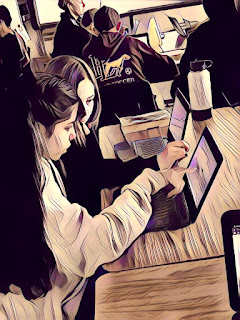I have found a remarkably effective way to get students writing and speaking. I let them work in pairs, specifically writing in pairs. Earth shattering, I know. This protocol works well for argument writing and narrative writing. It works equally well with my seniors and my 9th graders. It is remarkably easy to grade, and students produce really good products.
Process:
1. Students choose their own partners. (This works better than having assigned partners.) I usually don't tell them why they are choosing partners. I want them to pick their friends. That's fine.
2. I assign the prompt, but it is always to write a scene in the form of a dialog between two characters. For my seniors it was a scene between a director and an actor arguing about whether or not to cut a speech from a Hamlet production. For my 9th graders it was a scene about some pitfall of social media that had to tell a story with a moral. The seniors were writing to show they could argue and the 9th graders were writing to show they could create a narrative. I give them a day or two of class time for collaborative writing.
3. Once students write their script, somewhere between 500-1500 words depending on the grade level, they pair up with another group and read out their scenes for each other. This is a feedback strategy. One, it gets them actually reading their writing out loud, and two, each pair can ask questions and make suggestions to the other. It is also a rehearsal, but they don't know that.
At this point, students start to ask me, "Are we going to have to perform this in front of the class?" I play dumb and say, "What, you mean like stand up there live in front of everyone and read your scene? No, of course not. I would not make you do that." I carefully avoid mentioning anything about recording their scene, though.
4. Finally, I reveal that they will be recording their scenes. I have them use Adobe Express to create images for each part of their scene and then record their script as the voice over. Yes, some students are a little scared to record, but they don't want to let their partner down, so they almost always find a way to get it done. (This is part of the beauty of letting them work with a friend.) I find them places in the hallway, or an empty classroom to record. It usually takes a few days for all of them to get their recording done. Procrastination is a thing, but they almost all get to it eventually. The turn in rate for seniors for this project was much higher than it would have been for individual essay.
Assessment:
I watch their videos, often on a slightly accelerated speed, and listen for the writing standards I am looking for. Did they make an effective argument? Did they support it with evidence? Does the narrative have a structure? Is there a clear message?What I find, is that my seniors make much better arguments when the argument is a dialog because they naturally seem to intuit the back and forth of an argumentative conversation, a concept that is harder for them to grasp with a one sided essay.
My 9th graders tell much better stories when dialog is their only tool because the dialog has to move the story without narration. In the past, I have had students write stories that were only telling and not showing, all summative narration, no actual descriptive writing and very little dialog. I've taught so many writing lessons on show, don't tell, provided so many models and rubrics. None of that works as well as asking students to tell a story with only dialog. Maybe screenplays just work better for a generation raised with more video time than book time. (Sad, but true.)
Collaboration:
Writing with a partner is good for writing skills. Writing with a partner means students have to discuss a plan together, execute a plan together, write with immediate feedback from each other. They are both equally responsible for the outcome. I let them pick their partners, because they should get to write with someone they are comfortable with. And, I've noticed that students most often group themselves homogeneously. I don't worry that one partner will do all the work while the other one slacks off. That's rare. There is a certain poetic justice to seeing two students who usually try to avoid all work, gleefully pick each other as partners because they are buddies, and then realize that they are going to have to actually do some work because now that there is no one else to do it for them.
Results:
I've done these dialog projects two years in a row with both 9th graders and 12th graders and the results are consistent. My students write better arguments and better narratives, when they write them as a screenplay. Recording their scene provides extra accountability and speeds up my grading process significantly.
Added bonus: This project is engaging, achievable, and far less likely to be something students would want to ask an AI text generator to write for them. In the classroom, they literally pounce on their keyboards once they understand the task. The 'what if' statements start flying. "What if we have the director get really angry and threaten to cancel the play?" "What if the person being scammed tells their best friend about it?" At that point they really don't need me at all.

.png)
Great share but I am sure you have heard of Microsoft putting Flip into a walled garden, ending its free range life, turning off app, etc.?
ReplyDeleteYes, I’ve heard the news, but you do realize this post is from a year ago, way before that announcement. The tool will change, probably to Adobe Express, but the pedagogy remains the same.
Delete